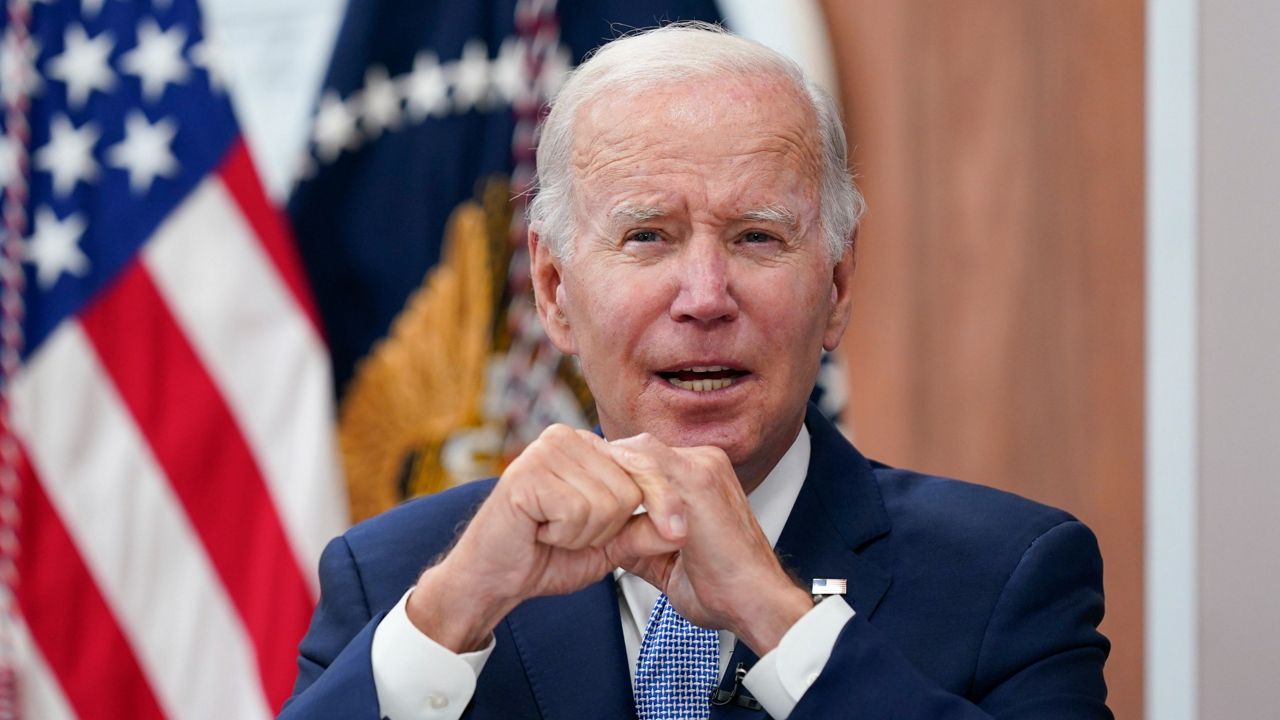Placing an emphasis on beating geopolitical competitors, strengthening the nation’s role as a global leader and tackling challenges that extend beyond U.S. borders, the Biden administration on Wednesday released its new National Security Strategy.
What You Need To Know
- Placing an emphasis on beating geopolitical competitors, strengthening the nation’s role as a global leader and tackling challenges that extend beyond U.S. borders, the Biden administration on Wednesday released its new National Security Strategy
- The report communicates the executive branch’s national security vision to Congress
- It is required by federal law to be published annually, although administrations often fail to meet that standard
- The new strategy comes as the U.S. faces a wide range of issues that could impact national security, including nuclear threats from Russia, Iran and North Korea; China’s e fforts to increase its influence in the Indo-Pacific; and climate change
“From the earliest days of my Presidency, I have argued that our world is at an inflection point,” Biden says in the preamble of the 48-page document. “How we respond to the tremendous challenges and the unprecedented opportunities we face today will determine the direction of our world and impact the security and prosperity of the American people for generations to come.”
The report communicates the executive branch’s national security vision to Congress. It is required by federal law to be published annually, although administrations often fail to meet that standard.
The Biden administration took the unusual step of releasing an interim strategy in March 2021, just a month and a half into Biden’s presidency. It originally planned to release a full report late last year, but the moves Russia was making along the Ukraine border at the time prompted the administration to withhold the document.
The new strategy comes as the U.S. faces a wide range of issues that could impact national security, including nuclear threats from Russia, Iran and North Korea; China’s e fforts to increase its influence in the Indo-Pacific; and climate change.
Meanwhile, Washington is reevaluating its relationship with Saudi Arabia after the Saudi-led OPEC+ oil cartel announced it was slashing oil production by 2 million barrels a day, which is likely to cause an increase in already-high gas prices in the U.S.
Biden’s strategy aims “to advance America’s vital interests, position the United States to outmaneuver our geopolitical competitors, tackle shared challenges, and set our world firmly on a path toward a brighter and more hopeful tomorrow.”
The White House said the “most pressing strategic challenge” comes from powers with authoritarian governments, namely China and Russia.
“It is their behavior that poses a challenge to international peace and stability—especially waging or preparing for wars of aggression, actively undermining the democratic political processes of other countries, leveraging technology and supply chains for coercion and repression, and exporting an illiberal model of international order,” the strategy says.
The Biden administration says it will aim to restrain Moscow while effectively competing against Beijing, which it says is the United States’ only competition capable of reshuffling the international order. The White House, however, said it will resist viewing most other countries as competition.
The strategy also sets a dual-track approach to tackle challenges shared with other nations, including climate change, food insecurity, infectious diseases and inflation. The plan is to collaborate with any country — including competitors — that want to address challenges while working with core allies to “create a latticework of strong, resilient” and mutually reinforced relationships “that prove democracies can deliver for their people and the world.”
“These partnerships amplify our capacity to respond to shared challenges and take on the issues that directly impact billions of people’s lives,” Biden says in the document. “If parents cannot feed their children, nothing else matters. When countries are repeatedly ravaged by climate disasters, entire futures are wiped out. And as we have all experienced, when pandemic diseases proliferate and spread, they can worsen inequities and bring the entire world to a standstill.”
Saying U.S. strength at home and abroad is inextricably linked, the White House also plans to invest domestically in the American workforce to bolster supply chains and develop emerging technologies as well as in the military.
“By modernizing our military, pursuing advanced technologies, and investing in our defense workforce, we will have strengthened deterrence in an era of increasing geopolitical confrontation, and positioned America to defend our homeland, our allies, partners, and interests overseas, and our values across the globe,” the strategy says.
The Biden administration is also stressing the importance of the U.S. strengthening its role as a leader on the global stage and actively engaging with nations throughout the world, which it says will “advance peace and security” and “promote prosperity in every region.”
“Around the world, the need for American leadership is as great as it has ever been,” Biden says in the document. “ … [T]he United States will lead with our values, and we will work in lockstep with our allies and partners and with all those who share our interests. We will not leave our future vulnerable to the whims of those who do not share our vision for a world that is free, open, prosperous, and secure.”



